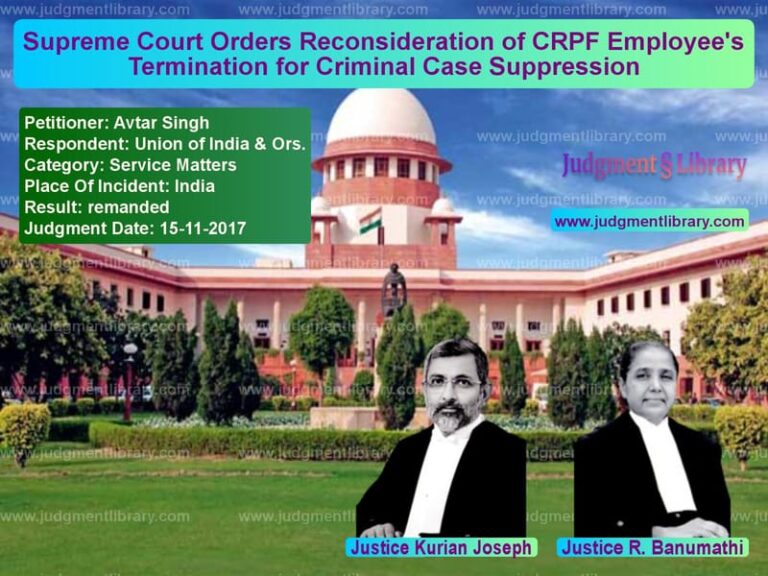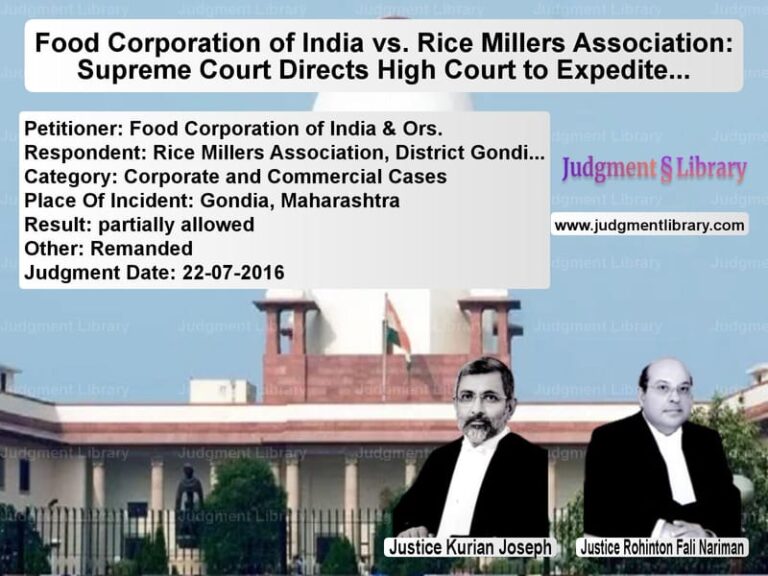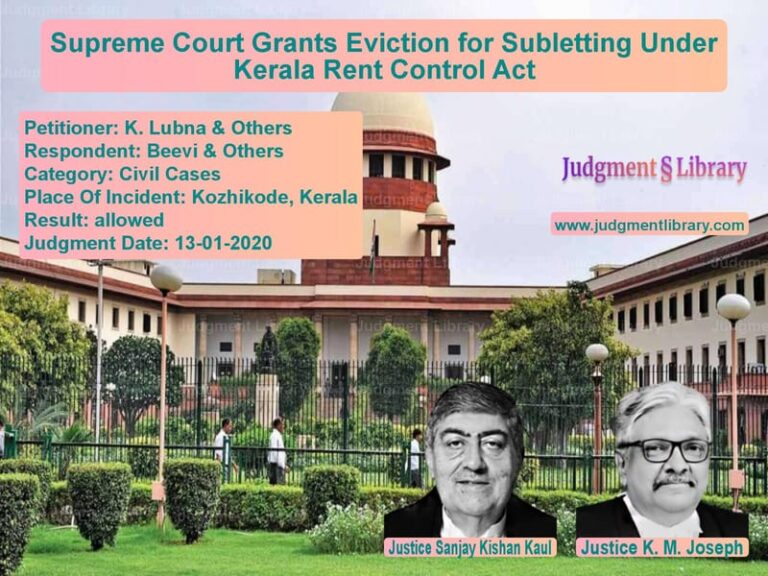Fairness in Law Officer Appointments: Supreme Court Mandates Transparency in State Hiring Practices
The Supreme Court of India, in Civil Appeal No. 3194 of 2016, along with Transfer Petition (C) No. 1073 of 2015, addressed the issue of fairness and transparency in the appointment of law officers by state governments. The case raised concerns about whether such appointments were arbitrary and violated Article 14 of the Constitution.
Background of the Case
The dispute arose from grievances regarding the appointment of law officers in Punjab and Haryana. The petitioners contended that the appointments were made arbitrarily without any clear criteria, leading to unfair selections. The case primarily revolved around the fairness of state employment practices and whether there was any due diligence in assessing the need for law officers.
Legal Questions Considered
- Did Punjab and Haryana conduct a proper assessment of the number of law officers required before making appointments?
- Did the states establish a policy, selection criteria, or transparent process for appointing law officers?
- Should such appointments be made in a fair, reasonable, non-discriminatory, and objective manner?
- If the existing process was found to be arbitrary, what remedial measures should be adopted?
Petitioners’ Arguments
The petitioners, who had served as law officers, argued that their services were terminated unfairly. They pointed out that individuals with lesser experience and competence were appointed in their place without any merit-based selection. They contended that the appointments were made purely at the discretion of the Advocate General without a structured recruitment process, which violated the constitutional guarantee of equality.
Furthermore, the petitioners highlighted that the lack of a selection process had led to political favoritism, where law officers were appointed based on personal relationships and political affiliations rather than professional merit. They sought a directive from the Court to frame clear policies for such appointments to prevent arbitrary decisions.
Respondents’ Arguments
The states of Punjab and Haryana defended their approach, arguing that law officers were appointed on a contractual basis and that such appointments were within the discretionary powers of the government. They contended that these engagements did not require a formal selection process since the appointments were professional engagements rather than permanent government jobs.
The respondents also argued that these appointments were temporary and subject to government needs. They claimed that while discretion was exercised in making these appointments, it was done in the interest of efficient legal representation for the state. Therefore, they contended that there was no need for judicial intervention in what was essentially an executive function.
Supreme Court’s Observations
The Court found that there was no structured process for assessing the actual requirement for law officers. The judges noted that several appointed officers were not assigned work, leading to unnecessary financial burdens on the state. The Court referred to the Comptroller and Auditor General’s (CAG) report, which highlighted systemic inefficiencies and mismanagement in law officer appointments.
The judgment emphasized the importance of fairness and transparency, stating: “Discharge of the trust reposed in them in the best possible manner is their primary duty. The power to engage, employ, or recruit servants, agents, advisers, and representatives must be exercised in a fair, reasonable, non-discriminatory, and objective manner.”
The Court also noted that arbitrary appointments not only resulted in financial losses but also compromised the quality of legal representation for the state. A proper merit-based system was necessary to ensure that qualified professionals were appointed to represent the government effectively in courts.
Judgment and Directives
The Supreme Court issued several key directives to address the issue:
- The states must conduct a realistic assessment of their actual need for law officers before making appointments.
- A Selection Committee must be formed to ensure that all appointments are based on merit.
- The Chief Justice of the High Court must be consulted before finalizing any law officer appointments.
- Future appointments must follow a transparent, fair, and objective selection process.
- Existing appointments would not be disturbed, but any extensions or fresh appointments must adhere to the new guidelines.
Implications of the Judgment
This ruling is a landmark in reinforcing accountability in government hiring. It sets a precedent that government appointments cannot be arbitrary and must adhere to principles of fairness. The directive for judicial oversight in the appointment process aims to eliminate political favoritism and ensure that only competent and experienced professionals represent the state.
By emphasizing transparency and fairness, the judgment protects not only the interests of the legal professionals involved but also ensures that state resources are utilized efficiently. The ruling also highlights the broader constitutional principle that state actions, even in professional engagements, must comply with the fundamental right to equality.
Don’t miss out on the full details! Download the complete judgment in PDF format below and gain valuable insights instantly!
Download Judgment: State of Punjab & An vs Brijeshwar Singh Cha Supreme Court of India Judgment Dated 29-03-2016-1741854000024.pdf
Direct Downlaod Judgment: Direct downlaod this Judgment
See all petitions in Recruitment Policies
See all petitions in Public Sector Employees
See all petitions in Employment Disputes
See all petitions in Judgment by T.S. Thakur
See all petitions in Judgment by Kurian Joseph
See all petitions in allowed
See all petitions in Modified
See all petitions in supreme court of India judgments March 2016
See all petitions in 2016 judgments
See all posts in Service Matters Category
See all allowed petitions in Service Matters Category
See all Dismissed petitions in Service Matters Category
See all partially allowed petitions in Service Matters Category







